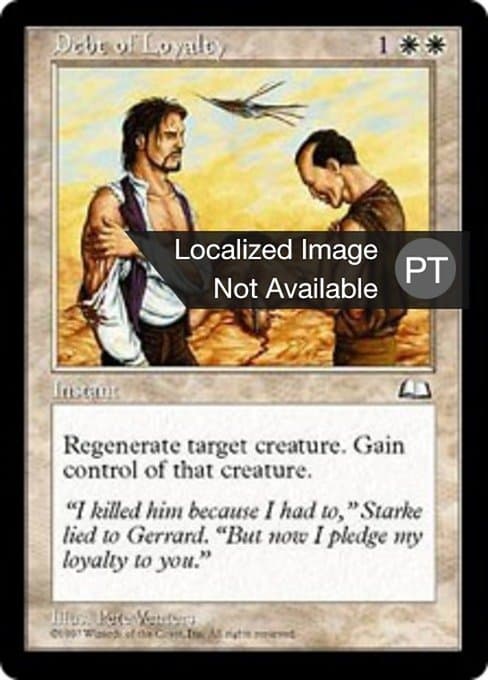
Dívida de Lealdade
Instant
Regenerate target creature. You gain control of that creature if it regenerates this way.
Illustrated by Pete Venters
· Weatherlight (WTH)
Debt of Loyalty
#11 · Rare · Portuguese · Nonfoil
Legal Formats
| Standard |
| Pioneer |
| Modern |
| Legacy |
| Vintage |
| Commander |
| Oathbreaker |
| Alchemy |
| Explorer |
| Historic |
| Timeless |
| Brawl |
| Pauper |
| Penny |
Variants
Under Construction
Prints
Rulings
2008-04-01 : Casting Debt of Loyalty puts a regeneration shield on a creature. If, later in the turn, that creature would be destroyed, instead it regenerates and you gain control of it. Note that it will be tapped when you gain control of it. The control change has no duration; you’ll retain control of that creature until the game ends or until some other effect causes it to change control.
2008-04-01 : If a creature has two regeneration shields on it — one from a Debt of Loyalty you cast and one from another effect — and it would be destroyed, its controller chooses which regeneration shield to use. If that player chooses to use the Debt of Loyalty shield, you’ll gain control of the creature. If the player chooses to use the other shield, you won’t gain control of the creature, but the Debt of Loyalty shield will remain on that creature for the rest of the turn (in case it would be destroyed again).
2008-04-01 : If you cast Debt of Loyalty but nothing happens to the targeted creature for the rest of the turn that would cause it to be destroyed, Debt of Loyalty has no visible effect. The regeneration shield wears off at the end of the turn. If the creature regenerates during a later turn, you won’t gain control of it.
2008-04-01 : You may cast Debt of Loyalty targeting a creature you already control. If you do, and that creature would be destroyed later in the turn, it will regenerate and you’ll gain control of it (though gaining control of a creature you already control usually has no visible effect).
2013-07-01 : A creature with indestructible never needs to regenerate, so Debt of Loyalty will have no effect on it.
Comments
Under Construction